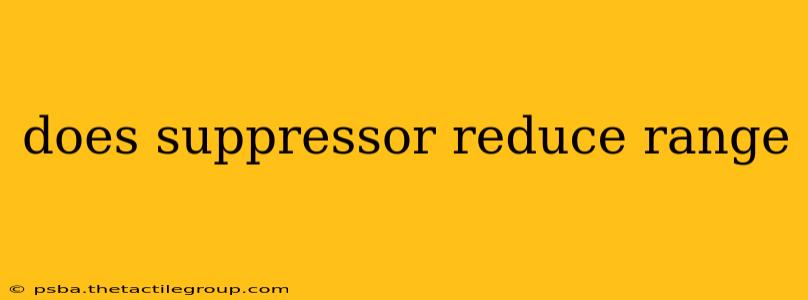The question of whether a suppressor (also known as a silencer) reduces the range of a firearm is complex, and the answer isn't a simple yes or no. While suppressors don't significantly alter the inherent ballistic properties of a bullet—factors like bullet weight, powder charge, and barrel length remain the primary determinants of range—they can indirectly affect effective range through subtle mechanisms.
The Subtle Impact of Suppressors on Range
The primary misconception is that suppressors somehow "suck" the energy out of a bullet, drastically reducing its range. This isn't accurate. Suppressors primarily work by reducing the explosive expansion of gases as they exit the barrel, thus lowering the report. However, this effect is relatively minor compared to the other factors impacting projectile trajectory.
Here's a breakdown of how suppressors can influence range, albeit minimally:
1. Back Pressure and Slight Velocity Reduction:
Suppressors do slightly increase back pressure within the barrel. This can lead to a minor reduction in muzzle velocity, which in turn translates to a slightly shorter maximum range. The degree of this reduction is often negligible, especially with properly designed suppressors and high-powered ammunition. We're talking about potentially a few yards, not tens or hundreds.
2. Increased Weight:
Adding a suppressor increases the overall weight of the firearm. While this is unlikely to significantly impact the bullet's trajectory in itself, it could affect the shooter's ability to maintain consistent accuracy at longer ranges. Fatigue and subtle shifts in aiming posture due to the added weight could lead to reduced accuracy and perceived shorter effective range.
3. Subsonic Ammunition:
The use of a suppressor often pairs with subsonic ammunition, which is designed to travel below the speed of sound. Subsonic ammunition inherently has a shorter range than supersonic ammunition due to its lower velocity. In this case, the reduced range is a direct result of the ammunition choice, not solely the suppressor itself.
Factors that Significantly Impact Range (More than Suppressors)
It's crucial to remember that other factors drastically outweigh the minor influence of a suppressor on range:
- Bullet Weight and Design: Heavier bullets generally retain velocity better over longer distances. Their design (e.g., ballistic coefficient) also plays a crucial role.
- Powder Charge: More powder means higher muzzle velocity and therefore longer range.
- Barrel Length: Longer barrels generally provide better velocity and consequently longer range.
- Environmental Conditions: Wind, temperature, and humidity significantly affect bullet trajectory and range.
Conclusion: The Minor Role of Suppressors in Range Reduction
While suppressors can introduce a very slight reduction in muzzle velocity and thus range, this effect is often negligible in practical terms. The impact of a suppressor on range is vastly overshadowed by other factors determining a bullet's trajectory and effective range. The choice to use a suppressor should primarily be based on sound reduction and other related benefits, not concerns about a minimal impact on range. For most shooting applications, the difference is insignificant.

